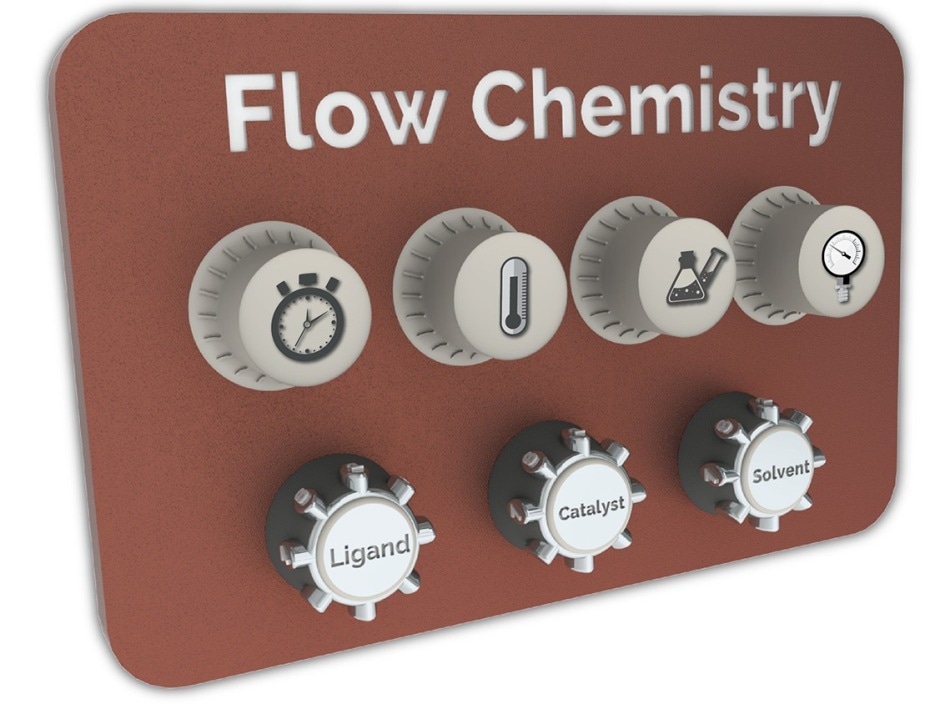Jul 30 2018
A new flow-based high-throughput screening technology that provides a faster, safer, and less expensive means of identifying best conditions for performing high-pressure/high-temperature catalytic chemical reactions has been created. The method concentrates on hydroformylation reactions, which are used to develop a range of commercial products.
 Researchers have developed a flow-based high-throughput screening technology that offers a faster, safer and less expensive means of identifying optimum conditions for performing high-pressure/high-temperature catalytic chemical reactions. The technique focuses on hydroformylation reactions, which are used to create a variety of commercial products. (Image credit: Milad Abolhasani)
Researchers have developed a flow-based high-throughput screening technology that offers a faster, safer and less expensive means of identifying optimum conditions for performing high-pressure/high-temperature catalytic chemical reactions. The technique focuses on hydroformylation reactions, which are used to create a variety of commercial products. (Image credit: Milad Abolhasani)
“Hydroformylation reactions are industrial processes that are used to make everything from plasticizers to detergents,” says Milad Abolhasani, corresponding author of a paper on the research and an assistant professor of chemical and biomolecular engineering at North Carolina State University. “The testing and analysis process for evaluating a single set of conditions using conventional techniques normally takes days. We can now do it in about 30 minutes.”
“Eastman uses the homogenous hydroformylation process to make secondary materials included in many products that enhance our quality of life in a material way, such as paints, pharmaceuticals, and inks,” says Dawn Mason, the external innovation manager at Eastman Chemical Company. “Being able to provide technological improvements in a safer and more expeditious manner than previously available is what makes our partnership with NC State successful.”
The new method uses very small samples - on the order of 11 microliters, instead of the milliliters used in conventional methods. The new method also combines reagent preparation, reaction processes, and analysis into a single sequence.
“Most optimization processes involve multiple steps that are conducted at different work stations,” Abolhasani says. “That’s one reason they take so long. By integrating these steps into a single, continuous sequence, we’ve made the process significantly more efficient.”
The high-throughput flow chemistry method and the smaller sample size also accelerate the reaction’s speed. But speed isn’t the sole benefit - the new method is also safer. That’s because these reactions have to be done under high pressures, and at high temperatures, using poisonous and flammable gases.
Our technique minimizes human interaction with these gases, since most of the work is done by robots. Also, we use only 60 microliters of these gases, where conventional techniques use a few milliliters or more - that’s a difference of at least two orders of magnitude, and that means our process is safer.
Milad Abolhasani
The comparatively small sample sizes also minimize the cost aspect. The ligands and catalysts used in the reactions are not cheap. By using smaller samples, the process requires fewer amounts of expensive ligands and catalyst material, decreasing the relevant expense by two to three orders of magnitude.
Ultimately, developing a more efficient technique for these reactions is important because it expedites R&D, allowing researchers to both improve manufacturing processes and to accelerate industry’s ability to identify new ligands that have commercial applications.
Milad Abolhasani
The paper titled “Flow Chemistry-Enabled Studies of Rhodium-Catalyzed Hydroformylation Reactions,” has been published in the Royal Society of Chemistry journal Chemical Communications. The paper’s first author is Cheng Zhu, a postdoctoral researcher at NC State. Co-authors include Keshav Raghuvanshi, a postdoc at NC State; Connor Coley of MIT; and Dawn Mason, Jody Rodgers and Mesfin Janka of Eastman Chemical Company. Eastman Chemical Company funded the research.
Single-Droplet Flow Chemistry